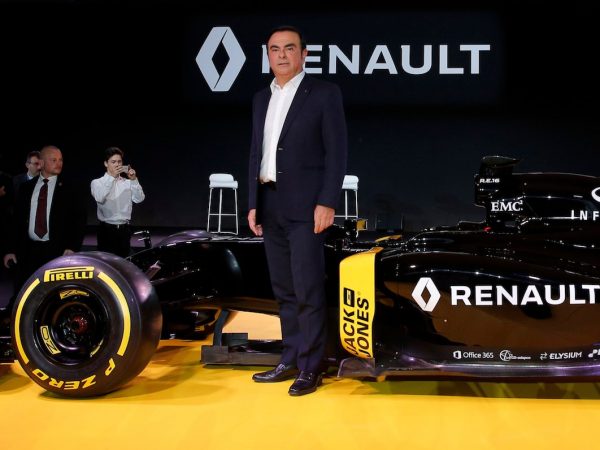 Renault defied its partner firm, Nissan, and the French government on Tuesday night as its board decided to retain Carlos Ghosn as its chairman and chief executive in spite of his shock arrest by Japanese prosecutors.
Renault defied its partner firm, Nissan, and the French government on Tuesday night as its board decided to retain Carlos Ghosn as its chairman and chief executive in spite of his shock arrest by Japanese prosecutors.
Renault’s board promoted Thierry Bolloré to deputy chief executive to head the company, but said the appointment was only made on a “temporary basis” in Ghosn’s absence.
Ghosn, the head of the Renault, Nissan and Mitsubishi car manufacturing alliance, is chairman and chief executive of Renault. He is also chairman of Nissan and Mitsubishi.
The actions of Renault’s board stand in stark contrast to those of its partners in the alliance, both of which quickly said they would remove Ghosn from their boards after Nissan said he had understated his income on financial statements.
In a statement following the board meeting, Renault said: “The board is unable to comment on the evidence seemingly gathered against Mr Ghosn by Nissan and the Japanese judicial authorities.”
Renault asked Nissan to share all of the evidence against Ghosn “on the basis of the principles of transparence, trust and mutual respect set forth in the Alliance Charter”.
Bolloré had written on Tuesday morning that Ghosn still had the “full support” of senior executives in a memo to staff published on an internal website.
Nissan said Ghosn was exposed by a whistleblower in a development that shocked the automotive industry. A highly influential figure in the sector in recent decades, the French-Brazilian executive forged an alliance between France’s Renault and Japan’s Nissan and Mitsubishi that created the world’s second largest car manufacturer.
Ghosn’s arrest in Tokyo prompted calls for his replacement. Bruno Le Maire, the French finance minister, said Ghosn had to step down from the French carmaker, in which the French state holds a 15% stake, as doubts rose about the ability of the alliance to survive without the unifying presence of its architect. “Carlos Ghosn is no longer in a position where he is capable of leading Renault,” Le Maire told France Info radio. “Renault has been weakened, which makes it all the more necessary to act quickly.”
Osamu Masuko, Mitsubishi’s chief executive, said on Tuesday he thought the three companies in the alliance would appoint separate new chairs because there was no executive of Ghosn’s calibre who could take on the combined role. “I don’t think there is anyone else on earth like Ghosn who could run Renault, Nissan and Mitsubishi,” Masuko told reporters in Tokyo.
The split between the alliance partners will raise questions about whether the companies will continue to pursue closer integration. The Financial Times reported on Tuesday that Nissan board members had tried to block a plan, recently pursued by Ghosn, to merge fully.
Renault said it remained “particularly focused on the consolidation of the Renault Nissan Mitsubishi alliance”.
Ghosn’s downfall was expected to trigger a battle between Japan and Francefor control of the alliance, which has an unorthodox governance structure. Renault owns 43.4% of Nissan, while Nissan owns 15% of Renault and 34% of Mitsubishi.
Hiroto Saikawa, Nissan’s chief executive, has previously expressed his opposition to a full merger between his firm and Renault. Saikawa appeared to distance himself from Ghosn’s reign in a press conference announcing his arrest on Monday.
Bolloré is perceived by analysts as a capable replacement for Ghosn at Renault, although it remains unclear if he will lead the alliance. Bolloré, a 55-year-old French national, started his career in 1990 at tyre maker, Michelin. He joined Renault in 2012, and was appointed chief operating officer in February this year.
Shares in Nissan plunged in Tokyo on Tuesday, ending down almost 5.5% and pulling the Nikkei index to a three-week low. Renault shares fell another 1.2%, after losing more than 8% on Monday.
Japanese prosecutors confirmed on Tuesday that they are investigating whether Ghosn and another senior Nissan executive, Greg Kelly, understated Ghosn’s income over five years from 2010. They are accused of reporting only half of his actual salary of almost 10bn yen (£69m) during the period. Ghosn is also accused of personal use of company assets.
Japan’s public broadcaster NHK reported that Nissan paid “huge sums” to buy luxury houses for Ghosn in four cities around the world. The properties, in Rio de Janeiro, Beirut, Paris and Amsterdam, were acquired “without any legitimate business reason”, it claimed.
The Guardian

Leave a Reply
You must be logged in to post a comment.